Le cercle rouge: StudioCanal Collection
This heist movie by the great French director Jean-Pierre Melville was apparently inspired when he was asked to write down his favourite aspects of the crime thriller and, coming up with 19, decided to make a film which included each one. Melville had made many crime movies before, perhaps most famously Le samourai in 1967 but this was his very first heist film.
When the film begins, you are not exactly sure whether you're watching a split narrative, a flashback or, as it seems, the events following two men, cutting between each. On exactly the same day, an upper middle class thief, Corey, is released from prison and tries to re-establish a normal life by buying a car travelling from Paris to Marseille whilst a murderer, Vogel who is being transported on a sleeper train escaped from custody, loses the vast manhunt and finds its way into the newly freed man's car.
The very beginning of the film shows a prison guard telling Corey about the perfect heist that will make him an absolute fortune but it is such a big job that only one man will be able to act as the 'fence'. Corey realises that he's inadvertently picked up Vogel and does his best to get through the checkpoints without the fugitive been found, realising that a man like Vogel will be perfect for a role in the small team to carry out the robbery. The only other role is for someone to scout out the premises and disable the alarm with a firearm and this can't be either Corey or Vogel as they will both be instantly recognised and neither can hit a target that small from that far away. Whilst all this is going on, the police officer who was guarding vocal on the train, Mattei, is doing his best to restore his reputation by using all of his contacts to try and bring him the murderer who gave him the slip.
With Vogel pretty much in hiding it is up to Corey to go to his associate's old haunts and connections in order to find the fence and the sharpshooter. Phoning a policeman who is in the middle of a drunken nightmare, he introduces himself as 'a friend of a friend' and agrees to meet the man, Jansen, at a club that belongs to Santini, an ex-con who has already been approached by Mattei and threatened if he does not tell him everything he knows about Vogel.
With Mattei doing his best to bring Vogel them, the three locate the jeweller's which they are going to rob, with Jansen going in as a prospective customer to find out what sort of security system it has, how the cases are locked and where the cameras are. All they need to do is pull off the perfect heist, take the jewels to the fence and, once he has successfully turned the jewels into couch, make off with the money. As usual, nothing will be that easy and, even if the robbery goes to plan, there is still the small matter of finding a fence they can trust.
This is a film that is directed with the utmost skill by Jean-Pierre Melville and his screenplay introduces you to the primary characters in a series of wonderfully designed shots and sequences that are cut together with incredible precision and craftsmanship. The robbery scene is one of the most tense and superbly choreographed ever committed to celluloid and is right up there with the one in Rififi in which Jules Dassin really cranks up the suspense to near breaking point. In this case, there aren't the same logistical problems that the themes to overcome but they do have to scale a building, breaking in, disable the guard and the security system without making a sound. Furthermore, because the whole building is under surveillance, they can't speak as their voices will give them away.
This really is a masterpiece of a heist movie with superb performances by Alain Delon as Corey, Gian Maria Volonté as Vogel, Yves Montand as Jansen and Bourvil as the icy cool Commissioner Mattei. All of these actors make an indelible impression on the audience and are perfect in the roles to the extent that I can't imagine anyone else as any of the characters. As heist films go, this is one of the finest I have ever seen and as a masterpiece in tension, suspense and constructing the perfect crime thriller.
The Disc
Extra Features
The introduction to the film by Ginette Vincendeau (21:30, SD) is an extremely in-depth and revealing visual essay by one of the most accessible academics on French cinema.
Code Name: Melville (76:37, SD) is a remarkably in-depth and comprehensive biography of the man and his movies starting when he was just a small child and going right through his career with contributions from peers, friends, family and the man himself courtesy of archival interviews. It is absolutely fascinating and should be a worthy watch for those who know Melville and those who don't.
Under the heading Le cercle rouge are interviews with three people:
Bernard Stora (Jean-Pierre Melville's Assistant Director) (30:45, SD) is an in-depth exploration of how Melville worked on set, his directorial style and why he was one of the few French directors like post-synchronisation sound.
José Giovanni (the screenwriter of Melville's film Second Breath (15:03, SD) also proves to be a fascinating interview subject as he knows a great deal about working with Melville and film industry in general and talks quickly and at length about Melville.
Rui Nogueira (author of Melville on Melville) (26:12, SD) is, as you'd expect from someone who has written a book on Melville, knows his stuff and is a fairly effusive speaker who seemed pleased to the opportunity to share anecdotes and his history of interviewing writing about Melville.
The only feature in high definition on this disc is the trailer which, for once, is an interesting addition.
As with the other releases in this collection, this comes with a booklet containing an essay by Ginette Vincendeau which is a terrific read and is as good as you'd expect to find from someone who has only recently completed a book on Jean-Pierre Melville.
The Picture
The level of detail in a film now 40 years old is extraordinarily high and I was amazed that the contrast levels were as deep as they are so there is no loss of clarity in the darker sequences, something that puts more recent films to shame. The Red Circle (or, to give it its French title, Le cercle rouge) looks absolutely stunning in 1080p high definition and is a film that is shot with such skill and beautiful cinematography that it deserves a transfer as good as this to really show off the time and effort that went into the aesthetics.
There is a fine mix of location shooting with some scenes taking place in the French countryside and others in the town, particularly Santini's club, and both come across extremely well with vibrant colours and wonderfully deep contrast levels.
The Sound
Presented in DTS-HD Master Audio 2.0 Mono, the soundtrack is extremely clear with crisp dialogue, excellent sound design and a superb score by Éric Demarsan. Sometimes it's a case of no sound be more effective than superbly mixed sound as the robbery takes place in complete silence with no dialogue or music and I imagine that any score would have drained the tension from the scene as it is the silence that builds the atmosphere and suspense.
The optional English subtitles are extremely well written, clear to see and error-free and, although they don't always entirely match the French dialogue, they are predominantly faithful to the original language.
Final Thoughts
Part of why the StudioCanal Collection is so great is that it is a mixture of films you know and love with others that you have never seen before. Prior to reviewing this disc, I had never seen The Red Circle and I'm amazed that I managed to go so long without seeing such a great movie. With a fine selection of extra features and a superlative AV package, this is a disc that comes highly recommended.
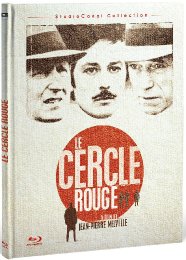
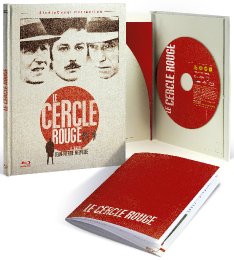
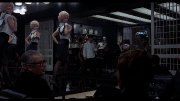
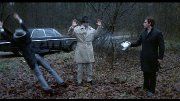
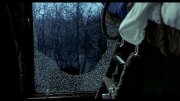
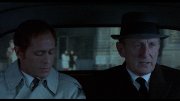
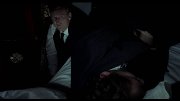
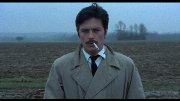
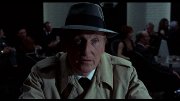
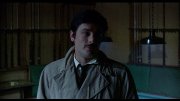
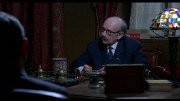
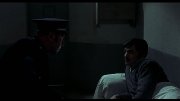
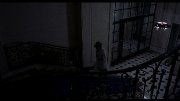
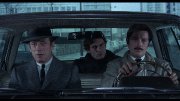
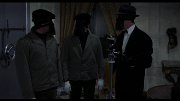
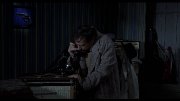






































Your Opinions and Comments
Be the first to post a comment!